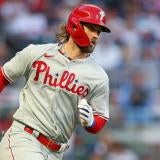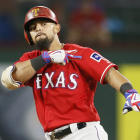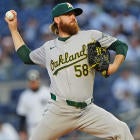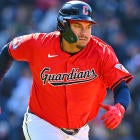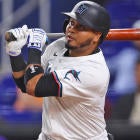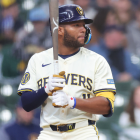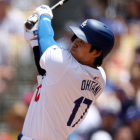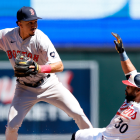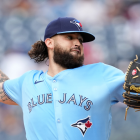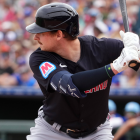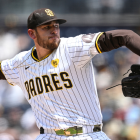Seven years ago, the Rangers were a fearsome offensive juggernaut.
Adrian Beltre was a franchise cornerstone, flashing big power in the middle of the order to go with his Gold Glove-caliber defense. Josh Hamilton was the reclamation project turned superstar, launching tape-measure home runs. Michael Young contended for batting titles. Nelson Cruz was the late bloomer who lengthened the lineup with even more power. Ian Kinsler was a 30-30 terror, walking more than he struck out and making everything go from the leadoff spot. Mike Napoli was the hulking slugger whose exploits were so celebrated in Arlington, fans chanted his name every time he strode to the plate.
During that 2011 season, the Rangers scored more runs than all but two teams, won more games than in any other season in franchise history, and charged to their second straight World Series appearance.
- 2018 Result: 67-95, fifth place in AL West
- Key free agents/losses: Jurickson Profar, Adrian Beltre, Robinson Chirinos, Matt Moore, Martin Perez, Bartolo Colon, Doug Fister, Yovani Gallardo, Tony Barnette
- Needs: Starting pitching, third base, catcher, center field, relief pitching
By 2018, those video-game numbers of the past had receded deep into fans' memory banks. Only six teams fared worse than Texas last season by park-adjusted offense: the terrible Padres, Giants, Royals, Marlins, Orioles, and Tigers. Only three Rangers position players, be they starters or bench jockeys, posted better-than-league-average offensive numbers in 2018.
One was Shin-Soo Choo, the skilled DH who enjoyed an impressive bounceback season...but is also 36 years old. Another was Jurickson Profar, the one-time best prospect in baseball who finally started to make good on his potential...only to get traded to Oakland earlier this month. The third is Joey Gallo, a big-time power hitter who smashed 40 home runs last season, is just 25 years old, and offers four years of controllable service time...who also has enough massive holes in his swing to strike out 207 times last season, and plays lousy defense everywhere the Rangers try him.
With Gallo thus the only plus hitter currently on the major league roster who looks like he could stick for a while, it's worth investigating what happened. The short answer is that the Rangers' player development machine, the one that produced Kinsler and Young, as well as Elvis Andrus, C.J. Wilson, Derek Holland, and other recent luminaries, has stalled.
The trajectory of Rougned Odor and Nomar Mazara illustrate that slowdown.
Odor broke into the big leagues four years ago, at the tender age of 20. By 22, he was one of the most exciting young stars in baseball, launching 33 home runs in his third big league season. He was also emerging as the combative young face of Rangers baseball, a talented, 5-foot-10 pain in the ass who often delivered a knockout blow to opponents, figuratively and sometimes literally.
But even at his best, Odor was a deeply flawed player, an overaggressive hitter who hammered mistakes but also frequently looked overmatched, and lacked the batting eye to work enough counts in his favor, or draw walks. Still, the Rangers invested in him early, much as they had with his skilled but offensively inconsistent double-play partner, Andrus. An improving gloveman who still packs a lot of power into his small frame, Odor is a reasonable investment for $54 million over the next five years. For the Rangers to be great, though, he needs to learn to control the strike zone and become an elite hitter. Still just 24 years old, the hope is that he eventually figures it all out.
Mazara too made the Show at age 20, bringing his own hefty prospect pedigree with him. Grabbing an everyday spot in the lineup and smacking 20 homers in 145 games as a rookie hinted at his considerable upside. But like Odor, Mazara hasn't yet taken the next step; few players in baseball have posted batting lines over a three-year stretch that are as stagnant as Mazara's .266/.320/.419, .253/.323/.422, and .258/.317/.436 to start his career. At age 23, he might have a lot more to offer as he approaches his prime years. If they can't lock him up the way they did with Andrus and Odor, the Rangers have three years of controllable service time left to wait on Mazara becoming a star.
After that, things get grim. What happened to the expected breakout of Delino DeShields Jr., the superspeedy center fielder who was supposed to run with the job last season and instead hit .216 and slugged a pitcher-like .281? What happened to Martin Perez and the generation of young, homegrown pitchers who were supposed to make an impact? How did Andrus go from finally fulfilling his offensive potential in his eighth and ninth big league seasons to falling back into banjo hitter territory in his 10th? Why did Profar need so long to finally make his mark in the majors, only to get shipped away right after it happened? Hell, what about all the intriguing Rangers prospects (Mike Olt?) who never even got as far as a steady gig in the majors?
The silver lining here is professional sports league reward bad results with cushy positions atop the following season's draft. That's the eighth overall pick for Texas next summer, with a couple more top-10 picks very much in play as the Rangers embark on a quirky sort of rebuild. To wit: de facto staff ace Mike Minor and his multi-year deal might get dealt this winter, but that's only after Texas tossed a multi-year deal at veteran righty Lance Lynn. The underlying theme seems to be acquiring as much good pitching as possible, with Rangers General Manager Jon Daniels recently talking up the skill of Brock Burke, the Rays minor league pitcher of the year who was the main prize in the Profar trade.
If pitching does indeed become the focus in trades, then it'll be up to Texas to jumpstart its own player development machine, whether in the majors with players like Odor and Mazara, or in the minors with toolsy prospects like Leody Taveras and Bubba Thompson. At some point, the Rangers will need to start hitting again to get back to good times like 2011, let alone actually get over the hump the next time such an opportunity presents itself.
Jonah on the MLB offseason
NL East
Braves: May be offseason's most compelling team
Marlins: Finding where to send Realmuto
Mets: How Mets could jumpstart BVW era
Phillies: Harper or Machado might not be enough
Nationals: What will the Nats do if Harper leaves?
NL Central
Cubs: Keys to a Cubs rebound in 2019
Reds: Can Cincy revamp its pitching staff?
Brewers: Why Milwaukee should dig deeper in its war chest
Pirates: How Buccos can get aggressive
Cardinals: St. Louis can close the NL Central gap
NL West
Diamondbacks: How drastic will the rebuild be?
Rockies: Colorado needs bats to match pitching staff
Dodgers: How L.A. can spend big this winter
Padres: San Diego is the biggest mystery team of the offseason
Giants: Trading MadBum and others makes sense
AL East
Orioles: Nowhere to go but up for new O's leadership
Red Sox: Active offseason could lead to World Series repeat
Yankees: Machado fits Yanks' wants and needs
Rays: Tampa in position for unusually aggressive winter
Blue Jays: Toronto needs to embrace rebuild
AL Central
White Sox: Compelling dark horse in Harper, Machado races
Indians: Why a Kluber or Bauer blockbuster makes sense
Tigers: Detroit facing plenty of rebuilding competition
Royals: Rebuild will rely on homegrown talent
Twins: Could be a big surprise team in 2019
AL West
Astros: How they can make another World Series run
Angels: L.A. changes winter approach
Athletics: Trying to defy expectations again in 2019
Mariners: Why massive rebuild makes sense











